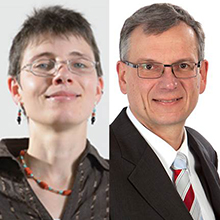

Dr. Larissa Schwarzkopf and Prof. Reiner Leidl
Source: Helmholtz Zentrum München (HMGU)
As part of their research, the team of scientists headed by Dr. Larissa Schwarzkopf and Prof. Reiner Leidl from the Institute of Health Economics and Health Care Management examined data from more than 17.000 lung cancer patients (approx. 12.000 men and about 5.000 women). “Our results are based on national performance data provided by the AOK (the biggest German SHI Fund, which covers about one third of the resident population). Cases of lung cancer which occurred in 2009 were recorded and their development was then observed over a three-year period,” explains first author Larissa Schwarzkopf. In the process, the scientists recorded operations as well as chemotherapy and radiation treatments.
20.000 euros per patient
The Helmholtz researchers, who are also affiliated to the German Center for Lung Research (DZL), discovered that the highest costs were incurred in the first six months after the initial cancer diagnosis. These were mainly attributable to in-patient hospital care. Consequently, outpatient oncology care played a secondary role. Average financial expenditure per case of lung cancer amounted to about 20.000 euros. However, this amount varied immensely, depending on the type of treatment provided. The striking feature was that one fifth of patients did not receive targeted cancer therapy.
Surgery offers the best outlook
Overall, the scientists found that about one third of patients received surgery. When compared with other types of treatment such as radiation therapy or chemotherapy (undergone by a total of just under 47 per cent of those affected by the disease), the outlook for this group was significantly better. However, the experts pointed out that surgical intervention is not always possible, nor is it always appropriate. In their view, there is therefore an urgent and growing need to develop more refined methods of early cancer detection in order to increase the chances of diagnosing the disease while it is still operable.
“These results mark the first step towards a better understanding of the health care and cost structures relating to lung cancer in Germany, and they are an important reference point,” says Reiner Leidl. “In order to obtain a better assessment of the realities of health care it would also be beneficial to conduct a more precise analysis of the drug therapy used.” For this purpose, the scientists plan to gather more data. Drug therapy in oncology is undergoing constant change, Larissa Schwarzkopf says. “It was only at the end of the study period that modern targeted therapeutic approaches such as monoclonal antibodies were integrated into health care. These approaches play an increasingly important role – in both therapeutic and economic terms. In future it would make sense to conduct a comparison with our reference data.”
Further information
Background
* While spending on radiotherapy and surgery (Per case over a three-year timeframe) amounted to about 26,000 and 20,000 euros respectively, there were also some patients who did not receive any specific therapy and whose treatment only cost 4,200 euros. For each year that the patients survived, average costs totaled 15,000 euros.
Original publication:
Schwarzkopf, l. et al. (2015). Cost-components of lung cancer care within the first three years after initial diagnosis in the context of different treatment regimens, Lung Cancer, DOI: 10.1016/j.lungcan.2015.09.005
As German Research Center for Environmental Health, Helmholtz Zentrum München pursues the goal of developing personalized medical approaches for the prevention and therapy of major common diseases such as diabetes mellitus and lung diseases. To achieve this, it investigates the interaction of genetics, environmental factors and lifestyle. The Helmholtz Zentrum München has about 2,300 staff members and is headquartered in Neuherberg in the north of Munich. Helmholtz Zentrum München is a member of the Helmholtz Association, a community of 18 scientific-technical and medical-biological research centers with a total of about 37,000 staff members. http://www.helmholtz-muenchen.de/en/index.html
The Institute of Health Economics and Health Care Management (IGM) examines approaches to improving the efficiency and cost-effectiveness of health care. The health care system faces the challenge of delivering high-quality, economically viable medical services to meet the needs of the population. Rapid advances in medical technology and fast-changing demographics further aggravate this problem. A firmly based evaluation of the effectiveness and efficiency of health care structures and processes is therefore an essential prerequisite for a rational health care policy. http://www.helmholtz-muenchen.de/en/igm/index.html
The German Center for Lung Research (DZL) is a national association that pools German expertise in the field of pulmonary research and coordinates basic research, epidemiology and clinical application. The DZL has five coordinating centers located in Borstel/Lübeck/Kiel/Grosshansdorf, Giessen/Marburg/Bad Nauheim, Hanover, Heidelberg and Munich. The goal of the DZL is to find answers to open questions in research into lung diseases by adopting an innovative, integrated approach and thus to make a sizeable contribution towards improving the prevention, diagnosis and treatment of lung diseases. http://www.dzl.de/index.php/de/
Contact for the media:
Department of Communication, Helmholtz Zentrum München – German Research Center for Environmental Health (GmbH), Ingolstädter Landstr. 1, 85764 Neuherberg – Phone: +49 89 3187 2238 – Fax: +49 89 3187 3324 – E-mail: presse@helmholtz-muenchen.de
Scientific contact at Helmholtz Zentrum München:
Dr. Larissa Schwarzkopf, Helmholtz Zentrum München – German Research Center for Environmental Health (GmbH), Institute of Health Economics and Health Care Management, Research Group Economics and Management of Lung Diseases, Ingolstädter Landstr. 1, 85764 Neuherberg – Phone: +49 89 3187 3994 – E-mail: l.schwarzkopf@helmholtz-muenchen.de
http://www.sciencedirect.com/science/article/pii/S0169500215300490 – Link to the original publication












